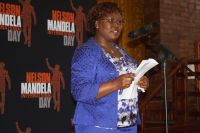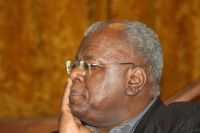“Human beings regard their mental capacity as the most defining feature of themselves as a species. To respond in a caring manner to the impairment of those capacities in others is to really know ourselves as human beings and to live out our humanness.” – Nelson Mandela
On 20 November 2013, the Nelson Mandela Foundation, together with Professor Jonathan Jansen, #HandsAcrossSA Ambassador Gareth Cliff, Tara Hospital and Headway, held a social dialogue on mental health stigmas, a critical social issue in our communities today.

Tara Hospital CEO Dr Florence Otieno
Part of an ongoing Mandela Day initiative led by #HandsAcrossSA, the conversation was facilitated by Gareth Cliff as MC, who is also a patron for Headway, and hosted at Tara Hospital in Hurlingham, Johannesburg.
Tara Hospital CEO Dr Florence Otieno officially welcomed guests to the event, acknowledging representatives from the Foundation, colleagues at the hospital and Headway, a non-profit organisation that helps rehabilitate those affected by brain injury following trauma or illness.
“Mental health issues are poorly understood and feared by members of society. Indeed, there is an urgent need for us to embrace open conversation about mental disorders,” she said.
“Mental illness is on the rise – and will soon overtake AIDS as the leading cause of illness in South Africa. Linking social responsibility to health systems within communities is key,” she added.
CEO of the Nelson Mandela Foundation Sello Hatang spoke about Mandela Day as an initiative that runs throughout the year, urging everyone everywhere to take action and inspire change within the community, not just on Mr Mandela’s birthday.
“This Mandela Day event is about inspiring change in our attitudes to mental illness. We are here, too, as the Foundation to pay our respects to health workers who do incredible work every day. Living the legacy doesn’t mean everyone has to be just like Madiba; it can mean doing what you do everyday and uplifting the community you live in,” he said.
Thoughts on mental health from the panel
Sheri Brynard, the only person with Down syndrome who is a qualified teacher, in the world, shared her incredible story.
“I am a person with Down syndrome. Every cell in my body has an extra chromosome; it’s a genetic disorder. But I count myself among the lucky ones – my disorder has a name,” she said.

Sheri Brynard
At 31, Brynard is an inspiration, a woman who has lived her life embracing diversity in people, and in herself. She became the first person ever with Down syndrome to qualify as a teacher, and has been invited to deliver the keynote speech at the Down Syndrome International Conference in New York on Down Syndrome International Day. She is also the recipient of a presidential award honouring her contribution to the lives of South Africa’s mentally handicapped people.
Speaking about Mr Mandela, Brynard urged the audience to forget about the failures of the past and focus on the future.
“This same philosophy helped Nelson Mandela survive 27 years in jail and emerge a president. He chose to take responsibility for himself, not feel sorry for himself. If we, too, can face each obstacle with determination and guts, we’ll make a difference.
“It is up to each of us to make the world a better place and to give people with disabilities the opportunity to be proud of what it is that makes them different,” she said.
Clinical Head at Tara Hospital Dr Mashadi Motlana spoke about old perceptions and beliefs, such as traditional psych units located on the outskirts of towns, where sufferers of mental illness were hidden.
“Tara started off as a farm and is now right in the middle of an upmarket suburb where our neighbours don’t want us,” she said. “Public stigma creates tremendous barriers to working in the mental healthcare field. It shapes everything from budget allocations to resource allocation.
“We work with creaking infrastructure on dilapidated grounds, since we compete with other medical conditions for national resources.”
Dr Motlana maintains that stigma around mental illness remains, saying that a review of the past 10 years shows that while people know more about mental illness, their stigmas have not shifted; in fact, making mental health a medical issue has exacerbated the situation.

Nicolene Holtzhausen
“Ask yourself what is the culture of stigmatising attitudes? The change must start with us, and it starts with the conversations we have,” she said.
Nicolene Holtzhausen, a representative from Headway, is a survivor. Having recovered from two severe car accidents, she today works as a laughter therapist.
“Five years ago I had a car accident. I woke up from a coma 43 days later – I had sustained a brain injury. I spent time at Headway after being discharged from hospital and was advised to not return to work. Unfortunately, I didn’t listen and went back to work, which ultimately resulted in a second car accident, and a second stay at Headway,” she said.
“I have now accepted the fact that I have a disability, a silent injury if you will. I suffer from memory loss, aggression and I don't handle pressure well. I work as a laughter therapist; I want to speak out for those who can’t and show the world that living with a disability isn’t something to be ashamed of.”
Prof Jonathan Jansen, Rector of the University of the Free State, has a passion for everyone’s learning – irrespective of ability.

Professor Jonathan Jansen, Rector of the University of the Free State
“If you keep telling people what they can’t do, they live up to that expectation,” he said.
“In South Africa we are victims – we talk ourselves down. We do it in our schools, our places of worship, and in politics. In our own country we have learnt, and speak, the language of defeat.
“The fact is, if you start by telling yourself what you can’t do, it will become a self-fulfilling prophecy. By the same token, if you listen to everybody’s stories about who you are and what you are – irrespective of whether they mean well or not – you are doomed to become that which they say you are.”
In closing, Cliff spoke about the day’s event as a victory – a positive step in the right direction towards building a positive future, and a society without excuses.
He thanked members of the panel for their inspirational stories and attitudes, and urged guests to take personal responsibility for whatever they view as their impairments, and not to make excuses.
The social conversation continues via @HandsAcrossSA and @NelsonMandela.

Gareth Cliff